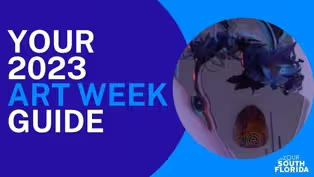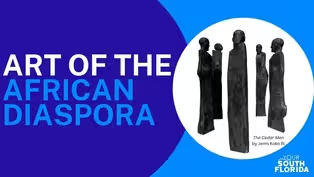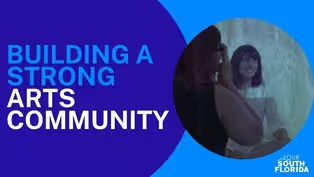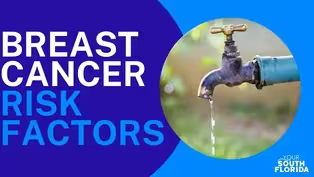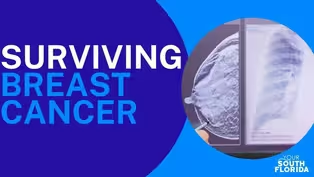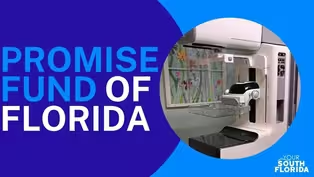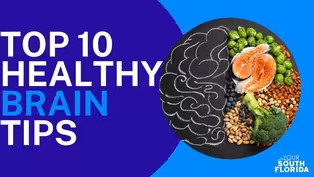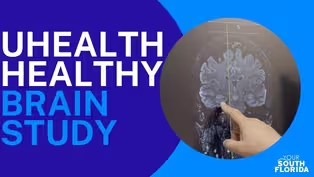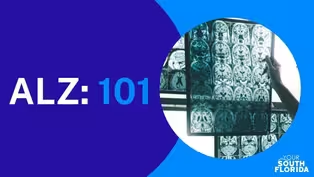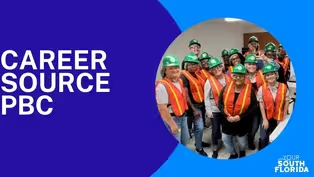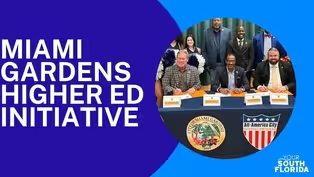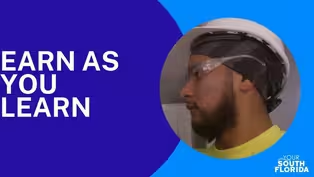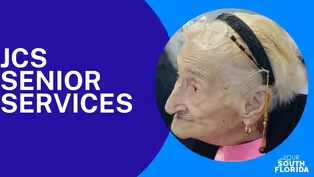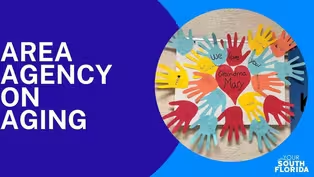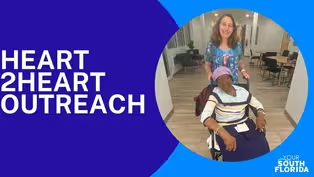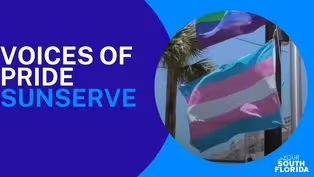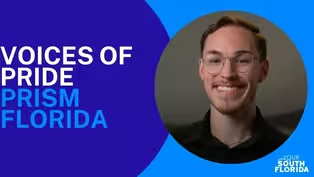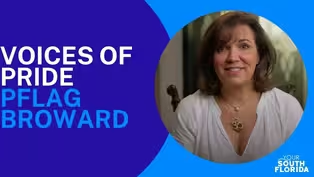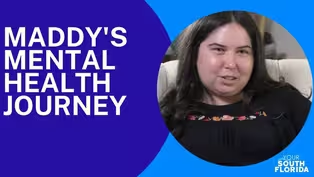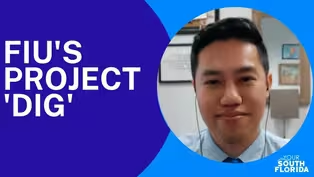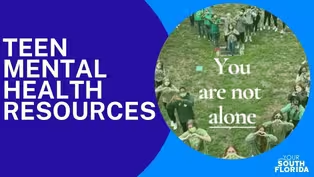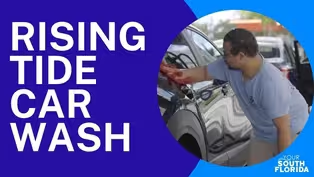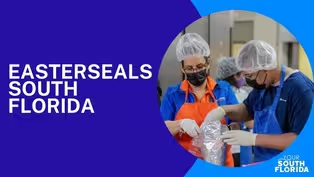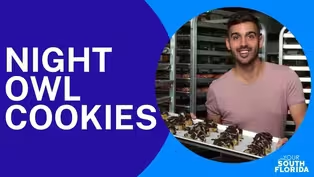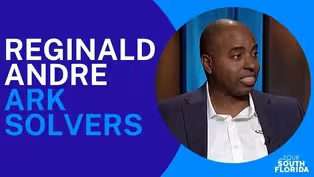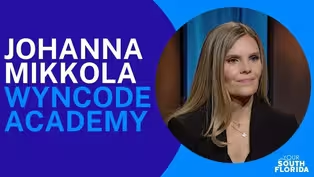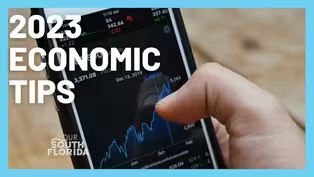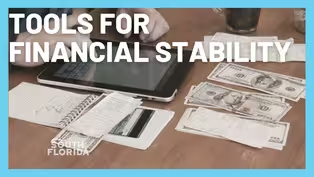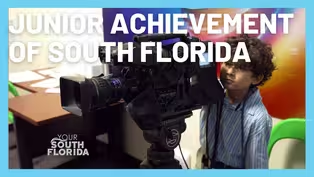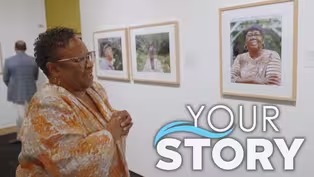Your South Florida
Connecting Women to FREE Mammograms
Clip: Season 7 | 6m 14sVideo has Closed Captions
Early detection is vital to breast cancer survival.
While prevention and early detection is vital to breast cancer survival, uninsured women are less likely to seek preventative care due to the costs and are more at risk. That’s why Susan G. Komen founder Nancy Brinker stepped in to help bridge that gap. She created the Promise Fund of Florida – a non-profit dedicated to removing barriers to quality healthcare.
Problems playing video? | Closed Captioning Feedback
Problems playing video? | Closed Captioning Feedback
Your South Florida is a local public television program presented by WPBT
Your South Florida
Connecting Women to FREE Mammograms
Clip: Season 7 | 6m 14sVideo has Closed Captions
While prevention and early detection is vital to breast cancer survival, uninsured women are less likely to seek preventative care due to the costs and are more at risk. That’s why Susan G. Komen founder Nancy Brinker stepped in to help bridge that gap. She created the Promise Fund of Florida – a non-profit dedicated to removing barriers to quality healthcare.
Problems playing video? | Closed Captioning Feedback
How to Watch Your South Florida
Your South Florida is available to stream on pbs.org and the free PBS App, available on iPhone, Apple TV, Android TV, Android smartphones, Amazon Fire TV, Amazon Fire Tablet, Roku, Samsung Smart TV, and Vizio.
Providing Support for PBS.org
Learn Moreabout PBS online sponsorshipThings don't happen unless they happen in a community first.
People don't like to travel to go be taken care of somewhere with healthcare, they wanna be treated in their hometown.
And they wanna know who's treating them and they wanna understand what's going on.
And we have an obligation not only to treat people, but educate people.
I know that sometimes the fear kind of paralyze us as a woman.
We're taking care of everybody else, of ourself.
I know for women, our family is the most important thing that we can have.
But if we don't protect ourself, we won't be able to protect our family.
I moved back to Florida after I served overseas and in Washington for over 10 years, and had lived in different places of the country, but something wasn't right.
And I did a lot of asking when I got back, "How are things in our community going on in Palm Beach County?"
When I found out that women's healthcare, certain women in our community, 80 to a hundred thousand was suffering, and they were suffering as a result, having no primary care.
And the only real source of care I came to find was part of the Federally Qualified Healthcare Center, centers that we have all over the United States.
And as I looked around, a great friend of mine was very involved in a federally qualified healthcare center here called FoundCare.
And then I approached them with my friends that we had gathered now to create the Promise Fund with this clear understanding that we're going to build a center for such cases that we were concerned about.
So Promise Fund target population is for women who are underserved.
As we know, the stats shows that minority women, African American and Latino or Hispanic women, are at higher risk of getting breast and cervical cancer.
So we want to make sure that when we go out there, that we provide that education component.
This is exactly what I wanted to do after I had spent almost 40 years building out an organization I named in honor of my sister, Susan Komen, and answering the second wish.
First, she asked me to see if I could cure the disease.
And then the second wish was really, "I want every woman to have access to care the way I did."
This is the natural follow on of building years and years of large funding to research, building the organization and communities.
And the Promise Fund now has created a real footprint in our community.
Over the last five years, we now have engaged over 22,000 women in our community who have either been through our program, screening, getting education, and connecting them to a source of primary care, so that now 7,000 of them easily now have a medical home and they know who to talk to.
And we have only found 94 cancers, largely early stage cancers, out of that many people taken care of.
Now, how did that happen?
Because we brought on over 20 patient navigators.
I think the way I see Promise Fund, we are that bridge.
We are that bridge that connects the community with the services.
Many times, the fear of this, of the people in our community is that, "Okay, so if they come back and say, you need a biopsy, I don't have funding to do that."
We are here.
We will provide that funding.
The biopsy, let's say, comes back positive.
Again, we sit down with the participant, and then we will follow up the next step and is connecting to treatment.
And we are working with partners in our community who will be able to provide that treatment.
And again, from A to Z, the entire what we call continuing of care, we will walk that with our patients.
These are people who become guides, just exactly what it sounds like, who can take a patient by the hand, start with a phone call.
And then once they have this bond of friendship, of guidance, of lack of fear.
The navigator basically becomes a member of their family and is always there to help them with whatever they need, whether it not be like for a breast or cervical cancer screening.
We'll connect them to like food banks, any resources that they may need, financial assistance, rental assistance, anything like that.
We're basically just there to help them and their families through any barriers that they may be facing at the time.
Patient navigators represent them.
Patient navigators are part of the community, and that makes a big difference.
They are not only bilingual, but also bicultural.
They understand the culture.
Culture plays such a big important part when we are working with the woman in our community.
Being a navigator for these women is such a fulfilling role for me, just because I do come from an immigrant family and I did see like all the stuff that my mom had to go through, and she was an early breast cancer survivor, and my parents, they had to work so many jobs.
So just giving back to the community is such a fulfilling role.
Movements are not easy to start.
It takes quite a while.
And in this case, this also represents a movement.
Work in the community.
If a community responds to a problem, the chances of the survival, of the solution, are great because people are involved.
And so with me, and I wake up every morning after all these years and smile because I know someone, somewhere today in our county is gonna get a mammogram, gonna have a checkup, gonna become part of a healthcare system, and very likely move through it and have a healthy life.
Your Expert Guide to Miami Art Week 2023
Video has Closed Captions
Clip: S7 | 28m 44s | We share tips for your best Miami Art Week 2023 experience. (28m 44s)
Discover The Art Transforming Opa-locka
Video has Closed Captions
Clip: S7 | 10m 27s | Discover The Art Transforming Opa-locka. (10m 27s)
Dennis Scholl on Housing Help for Artists
Video has Closed Captions
Clip: S7 | 8m 51s | Dennis Scholl discusses South Florida's burgeoning art scene & its impact on the economy. (8m 51s)
Video has Closed Captions
Clip: S7 | 9m 38s | Breast cancer researchers are studying an alarming trend in South Florida. (9m 38s)
Latest TIPS for Breast Cancer Prevention and Treatment.
Video has Closed Captions
Clip: S7 | 11m 31s | Join us in this important conversation about breast cancer prevention and treatment. (11m 31s)
Connecting Women to FREE Mammograms
Video has Closed Captions
Clip: S7 | 6m 14s | Early detection is vital to breast cancer survival. (6m 14s)
TOP 10 Tips to Help You LOVE Your Brain
Video has Closed Captions
Clip: S7 | 6m 53s | Learn about early detection and lifestyle changes for maintaining brain health. (6m 53s)
Healthy Brains Helping Researchers Fight Alzheimer's
Video has Closed Captions
Clip: S7 | 7m 9s | We look at how to better treat and prevent Alzheimer’s and related dementias. (7m 9s)
All You Need to Know About Alzheimer's
Video has Closed Captions
Clip: S7 | 12m 58s | We shed light on the latest developments in Alzheimer's care and support. (12m 58s)
Vocational & Workforce Resources
Video has Closed Captions
Clip: S7 | 10m 55s | CareerSource PBC is helping job seekers learn the skills they need. (10m 55s)
Video has Closed Captions
Clip: S7 | 10m 44s | Get the details on a new program making higher education more accessible. (10m 44s)
Video has Closed Captions
Clip: S7 | 5m 7s | We get an inside look at how apprenticeships can be a win-win for students and businesses. (5m 7s)
JCS Providing Meals & Community
Video has Closed Captions
Clip: S7 | 6m 2s | Jewish Community Services of South Florida works to maintain the health of seniors. (6m 2s)
Helpline for Older Adults & Caregivers
Video has Closed Captions
Clip: S7 | 9m 35s | Learn how the Area Agency on Aging of Palm Beach/Treasure Coast is helping older adults. (9m 35s)
Video has Closed Captions
Clip: S7 | 8m 55s | Heart2Heart Outreach of South Florida provides care for lonely seniors. (8m 55s)
Voices of PRIDE: Transgender Community
Video has Closed Captions
Clip: S7 | 5m 59s | We visit SunServe in Wilton Manors to hear from members of the Transgender community. (5m 59s)
Voices of PRIDE: Gen Z & LGBTQ+
Video has Closed Captions
Clip: S7 | 3m 27s | PRISM is a non-profit providing resources to South Florida' LGBTQ+ Gen Z community. (3m 27s)
Voices of PRIDE: A Parent's Perspective
Video has Closed Captions
Clip: S7 | 3m 17s | Lisa McCourt shares her perspective as the mother of a Transgender daughter. (3m 17s)
Video has Closed Captions
Clip: S7 | 4m 12s | We profile Maddy Tasini and her mental health journey. (4m 12s)
FIU Addresses Shortage of School Mental Health Professionals
Video has Closed Captions
Clip: S7 | 6m 34s | FIU has a new program that helps students with mental health issues. (6m 34s)
Mental Health Resources for Teens & Families
Video has Closed Captions
Clip: S7 | 12m 41s | Host Arlene Borenstein looks into local resources for at-risk teens and their families. (12m 41s)
Rising Tide Car Wash's Neurodivergent Workforce
Video has Closed Captions
Clip: S7 | 7m 3s | Rising Tide Car Wash is a successful business thanks to it's non-traditional workforce. (7m 3s)
Culinary Arts Program for Neurodivergent Students
Video has Closed Captions
Clip: S7 | 6m 1s | For decades, Easterseals South Florida has been helping neurodivergent students. (6m 1s)
Andrew Gonzalez l Road to Entrepreneurship
Video has Closed Captions
Clip: S7 | 7m 30s | Miami native Andrew Gonzalez followed his dream of making and selling late-night cookies. (7m 30s)
Reginald Andre l Road to Entrepreneurship
Video has Closed Captions
Clip: S7 | 7m 55s | Hear Reginald Andre talk about his inspirational entrepreneurial journey. (7m 55s)
Johanna Mikkola l Road to Entrepreneurship
Video has Closed Captions
Clip: S7 | 11m 6s | Johanna Mikkola saw the value in bringing a unique brand of coding bootcamps to S. Florida (11m 6s)
Your 2023 Economic Tips l Your South Florida
Video has Closed Captions
Clip: S7 | 9m 42s | Dr. Albert Williams shares his tips for financial health. (9m 42s)
Tools for Financial Stability with United Way Miami
Video has Closed Captions
Clip: S7 | 6m 27s | Nearly 6 out of 10 Miami households are living in or are on the verge of poverty. (6m 27s)
Junior Achievement of South Florida l Your South Florida
Video has Closed Captions
Clip: S7 | 6m 20s | Junior Achievement of South Florida teaches students about finances and building a career. (6m 20s)
Photographing Boca Raton’s Oldest Neighborhood | Your Story
Video has Closed Captions
Clip: S7 | 7m 22s | Founded in 1915, Pearl City is the oldest neighborhood in Boca Raton. (7m 22s)
Providing Support for PBS.org
Learn Moreabout PBS online sponsorshipSupport for PBS provided by:
Your South Florida is a local public television program presented by WPBT
